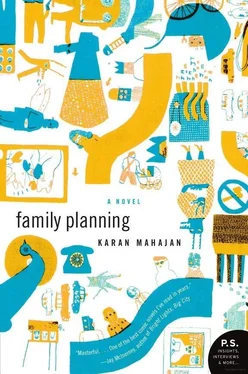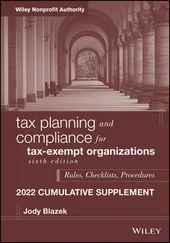“Really?” said Mr. Ahuja, feigning surprise. His own commands were being blamed on Sangita, but he had no intention of clarifying this. “Well, then, you all have to stand up for your bhaiya. You have to tell Mama that bhaiya is the same as all of you. Say to her — if bhaiya is step, then we are also step!”
“And if any of you ever treat him like step or ever say anything—” He comically pointed to his clenched fist.
“But Papa. We wouldn’t do that. He’s our bhaiya!”
“Yes, we love bhaiya.”
“He’s our favorite bhaiya.”
“Yes. He wipes me very hard.”
Wipes me very hard?
“He teaches me maths.”
Mr. Ahuja looked around at his children. They were so eager to please; their small brown limbs were restless; cheap plastic digital watches slid up and down their wrists; major kicking battles were underway beneath the table. He crinkled his eyebrows and said, “But what if I died and your Mama said you should be mean to him? Then? Then what would you do? You’d forget everything I said?”
It was a trick question. They answered accordingly.
“Papa you will never die,” said Sahil. A tear rolled down his cheek.
Then everyone started crying. Soft silent tears. Fake tears.
“Papa don’t die. We love you more.”
“Yes Papa. We listen to you, not Mama.”
“I love you Papa.”
“I love you Papa.”
“I love you more than Mama.”
Mr. Ahuja hugged them one by one, accepting the compliments gracefully. “No, no bacha. Don’t be like this. I was only saying. I will live for many many years. I’ll make sure Mama is not mean.”
It was such an easy victory — he was an emotional blackmailer, they were drama queens — and yet he felt ecstatic. That was all he wanted from life: A vote of confidence. Proof that even at the rate of an hour a day he could outperform Sangita in popularity, that no matter what he did in his political life, they’d love him. They were the reason he stayed in politics — they sanctified his corruption and confirmed his charisma. Even his youngest children, those who hadn’t learned the deceptions of language, who couldn’t speak at all and hence couldn’t fall for his gregarious sentences, trusted him utterly and completely. He was shaped to be trusted (his head hunched forward kindly). He was an upturned trumpet of honesty (his hands were always thrown up in glee). He had such brutish powers of telepathy (he misheard the way one should). His incisors sank so wonderfully into meat (he taught them to love tandoori chicken). He could tell they loved him when he held them up with a mythical straightening of the elbows; when they gnawed at his knees; when they confided in him; when they replied to the long e-mails he sent them from the road, each one jittery and show-offy with Mr. Ahuja’s memory for details.
Yes, thought Mr. Ahuja: If they resented Arjun for his closeness with their Papa, they also probably valued him for it. Mr. Ahuja relaxed. All he had to do now was talk to Arjun. “One final thing,” he said. “You all have to promise you will not ever —I am saying ever —tell Arjun anything I have said today. You will never call him a stepbrother or a half-brother or anything. You will behave just like you all have been acting, okay? Understood? Otherwise I’ll send you all to a hostel. If even one of you tells Arjun anything I will send all of you to a hostel, understand? I’m serious. I’m very, very serious.”
CHAPTER 11. THE BITTER HALF
AHEADSTART MEANS NOTHING if you have no wish to escape, and Sangita — Mrs. Ahuja, heavens — hadn’t wished to escape. She was twenty-six and too bewildered by her sudden initiation into sex the night before to go much further than the hotel gate. There she stood in bright sunlight and tossed her gold veil and swirled her monstrous dupatta to ventilate her fevered skin. Growing up, Sangita had thought herself so hideous that she was certain she’d never touch a man in her life, let alone sleep with him, and so sex for her had become a clinical obsession, a phenomenon to be chased in booklets and movies and gossip, her physical awareness of the act as flimsy as the wings of a butterfly you catch between your fingers for a second before it sputters away. On her wedding night, she’d felt as if she were hovering above herself, wafting, praying. Her mother had told her nothing about the formalities of intercourse. She didn’t bring any sexual dowry into the marriage. She complied readily when Rakesh said Let’s at least have sex , because, well, Why not ?
How else would she know?
The pleasure had been momentary — an island marooned in a night of awfulness — but pleasure it was. She awoke to a drooling man and urgent practicalities. She was married and sexed and disgraced, and a heap of trouble lay in store for her unless she alerted her family, frazzled them onto a train with their terrific rolls of bedding thumping behind them, and disappeared into the mist-guzzling elevations of Dalhousie forever. There, she’d give birth to Rakesh’s child — which she was no doubt carrying (Sangita’s rampant superstitions about sex and pregnancy were to be outdone only by her fertility) — and here was the tragedy: Rakesh would never know about it. Her mother, the famous Mummy, would never allow the child to reunite with its father. Instead it’d be reared by the entire sad-sack group of Mummy Papa Sangita Asha Raghav. A family together forever, the fruition of her Mummy’s plan.
Everything she’d told Rakesh the previous night about her family had been true.
Unfortunately, as soon as Sangita was cast out into the vista-flattening heat of the hotel parking lot, she realized: Delhi was a foreign city. There was nowhere to go. She’d told him the truth, and now she was at his mercy.
Also, she wanted to have sex again.
So she waited around, rehearsing a look of desperation on the drivers mopping their fancy cars. They responded with puzzled looks — as did Rakesh, who had jogged up behind her in a blast of sandy wind.
“What are you doing?” he said.
He was panting. She was standing. She admitted as much. “I am standing only. I did not want to bother you in morning-time—”
“Okay, okay.” He looked slightly irritated but was quick to swat it away with a gaze of fierce earnestness. “Look,” he said, “I’m sorry about last night. I hope you don’t think I am that sort of person. I was very surprised obviously. But I think we should stay married. This may sound strange, but I liked what you said. I liked that you were honest with me. You were very brave.”
There was nothing to say to this. She could not understand it. His stubble was dark and velvety and sweaty on the cheeks, and sparse around his mouth. It was as if he’d been beaten up and then bandaged in black gauze.
“I think we should stay married,” he repeated. “I believe in fate.”
Fate! Ha! Sangita could have died laughing.
Her fate, after all, was to be exposed. Not knowing what else to do, she went with him to his parents’ house.
The parents said, “It’s very nice to meet you Asha.”
“You also, naah, Mama, you are so confused,” clucked Rakesh. “Her name’s not Asha. It’s—” He didn’t know her name. Unbelievable.
“Sangita, ji,” said Sangita. “Asha was my pet-name.”
They were aghast, the poor parents. They kept apologizing. They looked so embarrassed they were about to die.
“They are very nice,” Sangita said, when they got in the car. “Such sweet people they are.”
She wondered: Was I good in bed? Is he taking me home? Is this really Arjun sitting in my lap? Is it possible Rakesh finds me attractive?
Читать дальше












